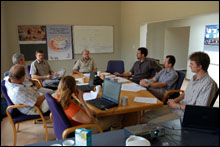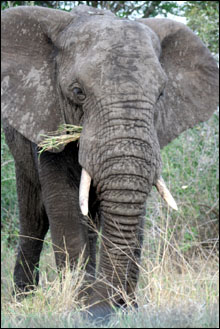SAEON Ndlovu Node's network grows ... and grows
|
The first Liaison Committee meeting of the Ndlovu Node was held in
October at the Node offices at the Phalaborwa gate to the Kruger
National Park.
During the meeting, the four non-SAEON members of the committee were brought up to speed on the current status of the Node, and then provided invaluable discussion and advice on the Node’s current and planned projects.
As Manager of the Node, Dr Tony Swemmer chaired the meeting, also attended by SAEON Head Johan Pauw, SAEON Specialist Scientist Prof Tim O’Connor and the remaining Node staff, Nikki Stevens and Joe Sibiya. Tony presented a draft of the Node business plan, including a node-level science plan which is intended to guide all research activities that the Node becomes involved in.
Pooling research experience
The committee members all have a long history of research in the savanna biome, on a diverse range of environmental-change topics, and the meeting provided an opportunity for the Node to draw on their wealth of knowledge and research experience.
The collaboration enables members to contribute directly to the growth and development of the Node, and paves the way for long-lasting and mutually beneficial relationships between the Node and an array of stakeholders.
The current non-SAEON members of the committee are Danie Pienaar, Head of Scientific Services (Savannas) for South African National Parks; Dr Mike Peel of the Agricultural Research Council, who oversees long-term ecological monitoring of private game reserves in the lowveld; Dr Wayne Twine, a social-ecology scientist who heads up the “Sustaining Natural Resources in African Ecosystems” programme based at WITS Rural Facility; and Dr Barend Erasmus, a global change ecologist at WITS University.
The committee agreed to meet regularly (twice a year) and advise on potential projects for the Node as they arise.
Lowveld Coordinated Research
In conjunction with Dr Mike Peel, the Ndlovu Node hosted yet another successful LOCORES meeting in September.
LOCORES (Lowveld Coordinated Research) is an informal association of conservationists and researchers living and working in the lowveld, and has been holdings meetings on-and-off for over ten years.
Over 50 people attended the meeting, including members of the general public, post-graduate researchers based in the lowveld, staff from Scientific Services (Kruger National Park) and game wardens from local nature reserves.
Presentations included topics covering elephant impacts on woodlands (Georgette Langedijk), the impact of HIV/AIDS on rural communities (Dr Wayne Twine), the effect of water provision on game distribution (Izak Smit) and plants (Helen Farmer), changes in climate predicted for the lowveld region (Nikki Stevens) and opportunities for collaborative projects with SAEON (Dr Tony Swemmer).
Nikki Stevens, the SAEON Ndlovu Node’s Information Manager organised the meeting, and the Timbavati Private Nature Reserve kindly provided a venue.
LOCORES looks set to grow and grow, and provides a great way for the Node to connect with conservationists and environmentally-minded members of the public.












